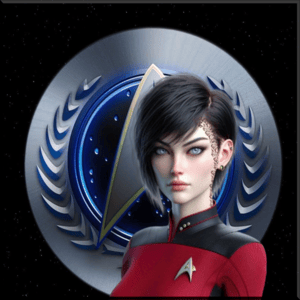On the bridge, Captain Alesser had the conn, while Commander Armstrong focused on the strange and exciting readings that were coming in from the long-range sensors. With the ship on a higher alert level, more processing power had been given over to the sensors to make sure that they weren’t leading their Romulan charges into some sort of trap, but it had also meant that they were collecting an enormous amount of scientific data on top of that, a boon for the science department which was currently left without much to do. Over half of Armstrong’s people had been pulled away for medical or logistics support duty, anyway, leaving just the bare minimum staff to ensure that ongoing experiments were maintained and live specimens were cared for.
“Do you think he’ll go for it?” Armstrong asked from the starboard station of the command rail, prompting Alesser to spin around the captain’s chair around. Before calling the captain, Armstrong had shared his findings with the first officer, but he sensed that the Ardanan man was less excited about it than he was. “You have to admit it’s hard to beat the timing.”
“He might let you take a runabout,” Alesser suggested.
“That’s not a great idea. They’re so—” Armstrong replied, but before the two of them could get further into those details, the bosun’s whistle sounded, and the captain stepped off of the turbolift. “Captain!”
Armstrong saw that Lancaster had a smile on his face when he entered the bridge, which he considered both to be an unusual occurrence and a sign that he might be able to get what he wanted from him. The captain approached him, glanced at the data, and then gestured for him to get on with his presentation.
“I have discovered a pod of gormaganders! They’re one degree off of our present course, less than a tenth of a lightyear away,” Armstrong explained, tapping a sequence of keys that brought up his readings on the main viewscreen. “We’re distinctly detecting the signals that they use to communicate with each other, and spectrographic readings confirm that there are fifteen to twenty of them. I’m requesting that we—,” he started, but the captain held up a hand.
“They’re not tagged?”
“No sir, that would be—,” Armstrong started.
“Helm, adjust our course by one degree to starboard. Number One, have the rest of the fleet follow. That should coincide with our first stop,” Lancaster replied to Armstrong’s stunned disbelief. “The Endangered Species Act clearly says that we must tag any gormaganders we locate within our space for conservation purposes. I assume that’s what you called me up here to ask for?”
“Uh, yes, sir. I thought you might have been more… reluctant,” Armstrong replied, clearing his throat.
“Astrozoan lifeforms are one of the marvels of our galaxy, Commander. Our passengers could use something like that. Besides, we’re explorers,” the captain said. “Recall what personnel you need to tag and catalog them. It’s a shame Admiral Hayden is guest lecturing this term. She’s always wanted to see a gormagander,” he mused.
“I’ll make sure to forward her the data, sir,” Armstrong replied with a smile. “Thank you, Captain.”
Armstrong turned back to his console and eagerly began ordering the replication and provisioning necessary to tag what were essentially space whales. The ship’s biology department was going to have a field day when they found out, and he was thrilled that he would be one of the few starship science officers to see a live gormagander in the wild.
“Captain, speaking of admirals, there is an incoming transmission from Fourth Fleet Command marked priority one,” Lieutenant Belvedere chimed in from the communication station just as Lancaster was about to take the center seat from Alesser.
“I’ll take it in the ready room,” Lancaster replied before leaving the bridge crew to their duties.
Once behind the doors of his ready room, Lancaster took a moment to straighten his uniform jacket before standing at ease in front of the communications terminal on the forward bulkhead. He’d found that when others could see that he was standing, calls tended to be shorter. The screen displayed the insignia of Fourth Fleet Command, bearing the distinctive bolt emblem that signified the fleet’s fast response mission. When he tapped the screen, that logo was replaced with the face of Commodore Uzoma Ekwueme, commander of the Fourth Fleet Expeditionary Group. The Arcturus wasn’t strictly speaking under his command in most routine operations, but with Hayden gone, Ekwueme was their link to base.
“Captain Lancaster, how are you?” Ekwueme asked.
“The mission is proceeding according to plan, sir,” Lancaster replied.
The commodore chuckled. “That’s not precisely what I asked, though the admiral tells me that your personal satisfaction and your job performance are tied quite closely together,” he replied.
Lancaster nodded. “Indeed, sir. What can I do for you?”
“Right to business, then. I’m calling ahead to let you know that Vice Admiral Dahlgren and most of his staff will be joining you in the field when you arrive at Gamma Sagittarii III. His courier just left,” the commodore explained. “He wants to shorten response times for our other assets further afield, and your ship has the appropriate communications equipment and space to make that happen.”
“Understood, sir. Does this happen to have anything to do with our possible defector?” he asked.
Ekwueme shook his head. “Not directly. But I wouldn’t be surprised if you got a call from Fourth Fleet Intelligence at some point,” he explained. “Do you believe the boy?”
“I’m not sure yet, sir. I think things will become clearer when he understands that he doesn’t need to trade anything for safety with us. I have a team working on verifying his credibility,” Lancaster explained.
“I saw the report. Oh, and, Captain? Just a word of advice: don’t expect Admiral Dahlgren to spend much time on the flag bridge. He’ll want to be in the thick of things in a way that your normal boss doesn’t,” Ekwueme warned. “Admiral Belvedere looked as happy as I’d ever seen him to see his courier leave sensor range.”
Lancaster clenched his jaw; the last thing he needed during a delicate operation was to figure out a new relationship with an unfamiliar flag officer who had a penchant for being hands-on. He had worked with Hayden for a very long time, almost a decade when all was said and done, so he didn’t relish the idea of breaking another admiral in.
“Thanks for the heads up, sir.”
“Ekwueme out,” the commodore said, smiling at him before ending the transmission.
The captain spent the next few hours at his desk, reading over reports and approving various parts of the operation they’d undertake when they arrived: resettling several thousand Romulans on empty land near an existing Federation colony. Every detail seemed to require not only his assent but a nod from every bureaucratic apparatus of Starfleet Command and the Federation government. While he found logistics puzzles to be quite stimulating, he’d just about lost his temper with reading through notes on what colors were acceptable for the initial housing units.
“Bridge to the captain. We’re preparing to drop out of warp,” Alesser reported over the comm.
By the time Lancaster entered the bridge, the ship had slowed from warp. Officers all around the bridge were confirming the status and disposition of the vessels accompanying them, while Commander Armstrong looked practically gleeful as he fine-tuned his instruments to catalog the gormagander pod.
“Report,” Lancaster said, moving towards the center seat.
“All ships accounted for, Captain. Our teams on Cardinal 1 are reporting that the engines are holding, but they need to fully shut down for forty-five minutes before we can resume course,” Alesser said.
“I thought it was going to be thirty minutes?”
Alesser shook his head. “Commander Slater would like the extra time to account for the extra strain that may have occurred during the course change,” he explained.
Lancaster glanced back at Armstrong, who didn’t seem to be listening. “Very well. Have we at least found the gormaganders?” he asked.
“Boy, have we, sir!” Armstrong replied, magnifying the viewer to show the pod of creatures more clearly.
Space whale was a good analogy for them, but physically they were something of a cross between cetaceans and cephalopods, with strange tentacles that held the organs they needed to traverse interstellar space. There was a mix of sizes and colors; Lancaster didn’t know enough about their biology to be sure, but he assumed it had something to do with age or sexual dimorphism. Silhouetted against the purple glow of a micro nebula—likely a source of some sustenance for them—they were a beautiful sight.
“All hands, this is the captain speaking. We are passing close by a pod of gormaganders for the next forty-five minutes. As this is an extremely rare occurrence, I’d encourage you to find a viewport or watch the external camera feed if you can,” Lancaster said. “This is—,” he started to continue but heard the sound of the announcement being paused.
“I’m sorry to cut you off, Captain, but we are being scanned,” Commander Navarro reported from operations.
“By whom?”
“That’s just it, Sir. If I’m reading this right, we’re being scanned by the gormaganders.”
“What?” Armstrong asked. “They can’t do that.”
“Red alert!” Lancaster ordered.

 Bravo Fleet
Bravo Fleet









